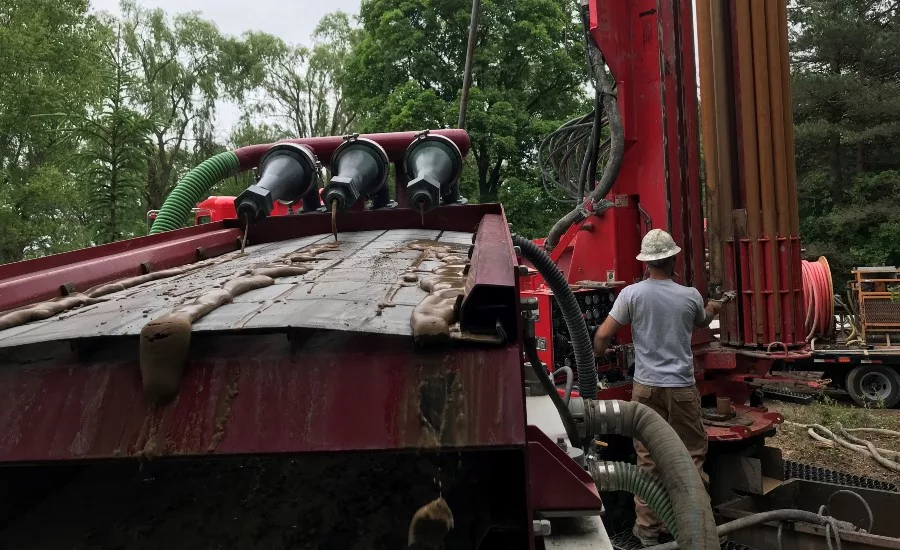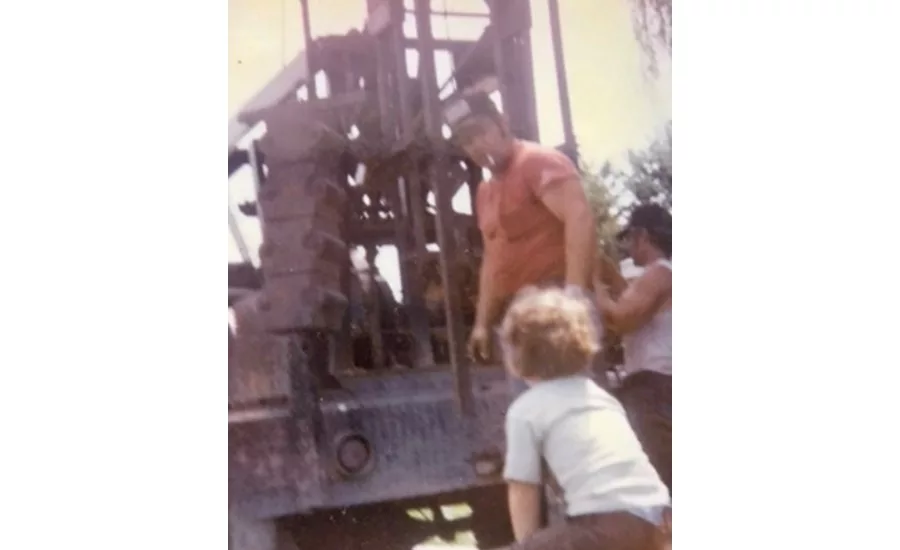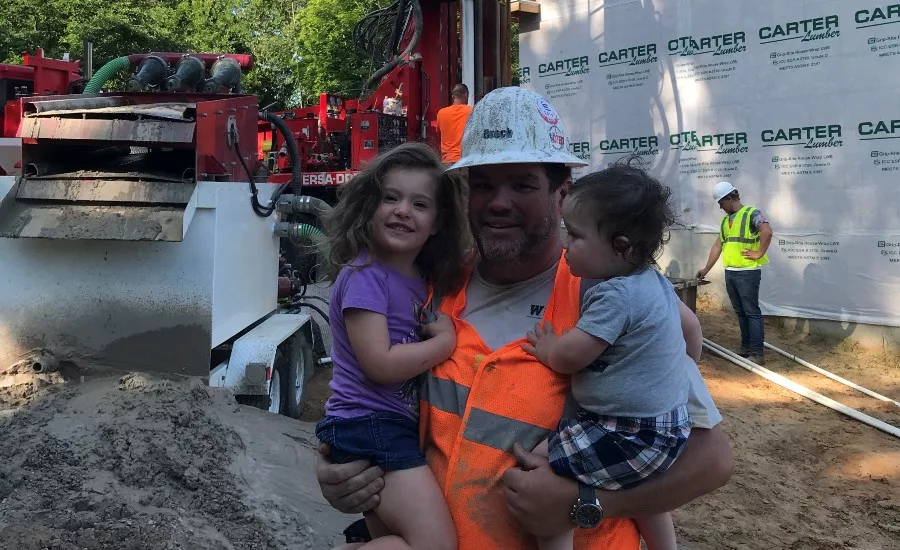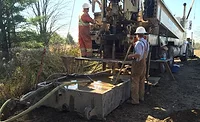Drill Training? Mentors Can Ease Ups, Downs
Growth as a Driller Often Requires Failure for Development

Drillers have to learn to succeed — and fail — while operating heavy equipment. Good mentors and trainers can help.
Source: Brock Yordy

A young Brock Yordy looks on as his father Chuck Yordy drills in this older photo. Note that hard hat use wasn’t as common at the time.
Source: Brock Yordy

Brock Yordy, with kids Brielle and Bo, says having his father Chuck Yordy as a drilling mentor helped him develop as a driller.
Source: Brock Yordy
Learning to be a driller is not a straight, upward trajectory. The lesson plan looks more like an old, wooden rollercoaster with a slow climb, followed by fast downs, twists, a few loops de loos, and a few moments where you believe the cart or track would come apart.
We survive those rollercoaster lessons with mentors who choose to sit down and strap in next to us. They already know the track and the lessons that make a great driller. The greatest lesson I learned from one of those mentors — a lesson that pushed me forward — was that failure is not only required for development and growth, but expected. To gain competence at discovering the unknown, one must accept that the possible outcome is not as bad, nor as good, as it seems.
Bad Day
Consider your worst day on a drilling project as a new driller. I had many bad days where I broke equipment, smashed bushings and lost tooling. Many companies cannot easily replace all damaged or lost products. I created situations for my family’s business that negatively impacted our bottom line for weeks. Yet, I had no fear of being fired because of my bad choices. As a matter of fact, my father told me, “You are stuck here, son.”
As the drilling and construction industry evolves and family drilling businesses dwindle, we lose a critical part of working with developing drillers. We lose the empathy we had with parental trainers. That affects how developing drillers handle problems. As trainers, what we do after a trainee’s failure defines the growth of that driller.
Brock’s Bad Day
Picture this: It’s early afternoon, we were ahead of schedule and feeling confident. Then I find myself standing there on the rig platform staring at a drill rod with an extra box attached to the pin side. The assistant clears the air with some very appropriate language for the moment. We are missing 79 additional feet of rod, a 15-foot stabilizer and a new 10-inch tricone button bit.
I immediately retrace the previous 30 minutes, thinking the whole time about how pissed the boss (my Dad) would be. When I punched through that sticky shale into coarse gravel and cobbles, I had to increase rotation. After a few jumps, the rotation smoothed out. Then, I was able to drill the 8 feet of production zone required for the well. As we laid the rod with the extra box end down, I wondered how I let this happen. The rod sheared off perfectly.
Finally, I call my father to deliver the bad news. I expect anger and a flurry of swearing. Instead, I hear a calm, collected voice explain his readiness to move past the failure. That call has stuck with me and defined the driller and leader I have become.
To give some insight into my family’s story, my father, Chuck Yordy, served as a United States Marine in Vietnam in 1968 before owning his own drilling company. He received the prestigious Navy Cross in his final month of service. Less than two weeks later, while on night patrols in the jungle, he encountered an improvised explosive device that ended his career in the Marines. He spent 11 months at the Great Lakes Naval Hospital.
Three months after rehabilitation, he met my mother at a rodeo — where he was bull riding. He went on to becoming a Michigan water well driller and father to three sons.
Over years working for the family business and farm, I watched him seamlessly recall the swift and violent tenacity required to move the immovable — often with some tenacious language. When I lost that new bit, stabilizer and four rods, I expected to talk to the U.S. Marine owner of Yordy and Sons, not my father (like the time I backed the service truck into the supply house salesman’s new truck).
Get Back on the Platform
My father knew that getting angry in the moment of a failure did not solve the problem at hand. He arrived at the job with a cable tool tapper tap-connected to a winged stabilizer. He told me the plan and then said, “Hop up there. You are recovering these tools.”
“No. I have cost the company enough money today,” I replied.
Then my father taught me another lesson that stuck with me. “As a driller you are going to fail. Sometimes, understanding the outcome of a decision is only known after the job is complete. Next time you encounter this situation you will know what to do.”
I tripped back into the hole, and we recovered all the tools the same day. That bad day turned out not as bad as I expected because I knew the owner had my back.
Remember Your Development
I often reflect on my father’s choice to push me past failures and set me up for success. Many great drillers have grown out of a father’s empathy. My father could see choices I made and remember similar ones he had made at my age. Some would say it takes a parent’s love to shift from anger to forgiveness like my father did in this case. However, that is not the case. It doesn’t require blood ties for a mentor to have positive impacts on people. We need more trainers who can relate to trainees and share similar feelings toward development. We need mentors who not only get on the rollercoaster but say, “Let’s sit in the front.”
Adopt a Developing Driller, Right Now
Given the uncertainty of tomorrow, the time to start teaching is today. My mentors have made it easy for me to volunteer for some tough projects. I found it easy because I knew that if I got in trouble, I could start calling on my mentors to advise me on a successful outcome. I share my experiences and what I have learned from mentors because, once I know that information passes on, I can focus on learning the next innovation. Even more important, when I share that knowledge, it outlives me.
In this industry, we put a greater focus on teaching toward the ends of careers. Let’s break up that culture. It’s hard to teach a lifetime of tribal lessons in the final years of your career. I would not be the man I am today if my mentors had waited until retirement to share all they know. With so many aspects and situations in drilling, everyone in our industry should teach at least one thing they excel at executing. To develop a new generation, we must meet the energy they create through our passion for drilling.
I live by the motto that you don’t truly know a subject until you can teach it. To teach and mentor is to know your craft. Becoming competent at discovering the unknown requires teachers willing to teach the lesson of overcoming failures to allow the next generation to advance beyond them.
I dedicate these experiences and lessons to my father, Charles R. Yordy, 1948-2021.
Looking for a reprint of this article?
From high-res PDFs to custom plaques, order your copy today!





